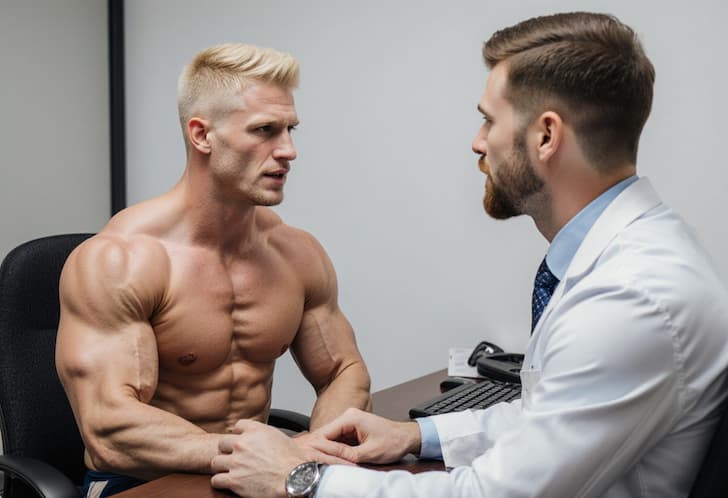You ripped open the envelope or stared at the patient portal and the words hit you like a fist: reactive, positive, detected. Your stomach drops, your dick instantly feels weird even though nothing’s changed down there, and a thousand thoughts explode at once – who gave it to me, who did I give it to, am I gonna die, does this mean I’m dirty now? Breathe, man. This guide is written by a gay man who’s been exactly where you are, for gay men only, because our sex, our risks, and our fallout are different.
Every word here is battle-tested from guys in saunas, dark rooms, chem parties, and monogamy-gone-wrong. We skip the hand-holding public-service bullshit and talk straight: what you do in the next hours, days, and weeks when you find out you’ve got the clap, herpes, syphilis, hep C, HIV, or whatever else decided to move in.
The First 24 Hours – Lock Shit Down Before Panic Spreads
Shock hits hardest right after the result. Your brain will scream to delete apps, block fuckbuds, and pretend this isn’t happening. Fight that urge because one dumb move now fucks other dudes over and makes your life harder later. You owe the guys you’ve railed or who’ve railed you the truth, fast.
The clock starts ticking the second you know. Some infections turn you hyper-infectious for a short window, others stay contagious for weeks if untreated. Your job is to stop the chain right fucking now. Guilt will try to choke you – shove it aside and act.
You still have to eat, sleep, and not lose your mind while the world feels like it’s ending. Rage, grief, and horniness all slam you at once. Handle the logistics first, feelings second. Survival beats wallowing.
- Tell every guy you’ve fucked or who fucked you in the relevant window – no exceptions. Text them the exact infection, the date you tested positive, and tell them to get tested or treated. Include tops, bottoms, vers guys, one-nighters, regulars, and that dude whose name you never got. Send the message even if it’s been months for some bugs – better they hate you than stay infected. Keep screenshots in case someone comes at you later.
- Delete or freeze your hookup apps for at least 72 hours. The urge to go numb yourself with random dick will be nuclear. You’ll want to prove you’re still fuckable or punish yourself with risky loads – neither helps. Lock the apps, turn off notifications, and give your head a minute to settle. You can go back harder than ever later when you know your status inside out.
- Call the clinic or your doctor the same day and book the soonest slot. Tell the receptionist it’s urgent follow-up to a positive test – they’ll squeeze you in. Ask if you need to start meds immediately or if waiting for the confirm slot is safe. Get blood drawn for resistance testing if it’s HIV or hep C. Bring a list of every guy you remember barebacking so contact tracing goes fast.
- Stock the house with whatever keeps you sane but not wrecked. Buy food that doesn’t need cooking, lube that won’t burn if you’re suddenly on antibiotics, poppers if that’s your thing, weed or booze in strict limits. Line up porn you actually like because jerking off will be part of processing this. Tell one trusted friend – just one – so you’re not alone if the walls close in. Set a timer to sleep because adrenaline will try to keep you up for days.
Telling Recent Partners Without Blowing Up Your Life
Disclosing to dudes you’ve smashed feels like ripping your chest open. Half will ghost, a quarter will flip out, a few will thank you, and one or two might already know they gave it to you. Either way, you don’t get to choose their reaction – you only control your message. Do it clean, fast, and from a burner if you’re scared.
Some guys want every detail, others just want the headline and clinic info. Read the room through text first. Never apologize for having sex – apologize only if you knew and still barebacked. The goal is to give them the facts so they protect themselves and others.
You’ll be tempted to lie, downplay, or vanish. Resist that shit. Every time you chicken out, another brother stays in the dark and the cycle keeps rolling.
- Craft one master text you copy-paste with small tweaks. Start with “Hey man, hate doing this over text but I owe you a heads-up.” State the infection clearly, when you tested positive, and the exposure window. Add “I’m getting treated, you should too – no symptoms needed.” Finish with the clinic’s anonymous notification link or your city’s health department text service.
- Send it to the nameless Grindr torsos too. Screenshot their blank pic or bio before you hit send because they’ll block instantly. Use the “last seen” timestamp to prove it was recent if they try to play dumb later. Include torso grid coordinates if that’s all you’ve got – they’ll know it’s them. Accept the block and move on – your conscience is clean.
- Handle the angry replies like a grown-ass man. Some dude will call you every name in the book and threaten to out you. Let him scream, don’t argue medical facts over text, and don’t send dick pics to calm him down. Screenshot the threats in case you need them for a restraining order or police report. Block once he’s done raging – you did your part.
- Use the anonymous notification tools for the ones you’re terrified to face. Every major city has a service where the health department texts or calls without your name. It feels like copping out, but an anonymous alert still saves lives. Do it for married guys, guys in the closet, or anyone whose reaction scares you. You still told – just smarter.
Starting Treatment and Owning Your New Status
Clinics love to drown you in pamphlets and soft voices. Cut through that noise and get the meds in your hand the same week. Some infections clear in days, others you manage for life – either way, the sooner you start, the less damage. Ask hard questions and don’t leave until you know exactly what the pills do.
Your viral load or bacterial count drops fast on treatment for most bugs. That means you stop being a walking biohazard way sooner than you think. Modern meds are stupidly good – we’re not living in the 80s. Take them exactly as prescribed or resistance fucks you forever.
Side effects hit some guys hard, others breeze through. Stock up on whatever makes the first weeks bearable. Your dick still works, your holes still take dick – nothing about treatment kills sex unless you let it.
- Swallow the first dose in the clinic parking lot if they let you. Some antibiotics or antivirals start working in hours. Crush syphilis or gonorrhea before it spreads to your brain or balls. Get the Biktarvy or DoxyPEP script filled at the pharmacy downstairs – no delays. Text a buddy a selfie holding the bag so you’re accountable.
- Set alarms that don’t sound like normal life. Use labels like “Take or your ass gets resistant” so you never forget. Stash extra pills in your gym bag, work desk, and hookup go-bag. Tie the routine to something you already do – brush teeth, jerk off, smoke a cig. Miss zero doses the first month – that’s when forgiveness is lowest.
- Line up the follow-up bloodwork before you leave the first appointment. Book the test-of-cure or viral load draw right then. Write the date on your bathroom mirror in dry-erase marker. Tell the phlebotomist you’re a hard stick and need the butterfly needle – save yourself bruises. Celebrate undetectable or negative results with the hardest fuck you can line up.
- Stock the war chest for side effects. Zofran for nausea, Imodium for doxycycline shits, Gatorade for dehydration, weed or prescribed benzos for sleep. Buy the good lube because some meds dry you out. Keep protein bars around because some pills wreck appetite. Jerk off anyway – orgasm is the best painkiller you own.
Getting Back on the Horse – Having Sex Again Without Guilt or New Infections
The doctor says you’re non-contagious and you’re itching to get railed or rail someone. Your brain still whispers you’re toxic waste. Push through that noise because sex is still yours. You just do it smarter now.
PrEP, DoxyPEP, undetectable status, and condoms are all tools in the toolbox – use multiple layers. Disclose early and often; the guys worth fucking won’t run. The ones who do were never your tribe anyway.
Your body feels different after diagnosis – own that shit. Some guys fuck harder after a scare, others slow down. Both are valid. The goal is loads without fresh infections.
- Update every profile with your current status the day you’re cleared. Put HIV+ undetectabIe, herpes 2 (on valacyclovir), whatever it is – bold and upfront. Add “asks me anything” so they know you’re open. Watch the messages flood from guys who want exactly what you’re packing now. Block the “ew poz” holes instantly – saves time.
- Carry DoxyPEP in a pill case that looks like a lighter. Pop 200 mg within 24 hours – 72 max – after raw sex if you’re worried about syphilis, chlamydia, or gonorrhea. Tell the guy you’re taking it so he knows you’re covering bases. Keep a spare dose in every jacket because you never know where the night ends. Thank the Aussies for this goddamn miracle.
- Learn the real transmission risks cold. Undetectable HIV doesn’t transmit – full stop, zero cases ever. Herpes sheds 4-10% of days on meds, less if you’re strict. Syphilis drops off the radar two days after the shot. Use that knowledge to shut down fear when a nervous bottom asks questions.
- Build a roster of regulars who already know and don’t care. The first fuck after diagnosis feels like a victory lap – make it with someone who’s been through the chat. Trade recent labs like baseball cards. Turn “I’m positive too” into the hottest dirty talk you’ve ever had. Keep those numbers saved under fire emojis.
RANEU Enema Bulb Silicone Anal Douche Enema Kit
- Reusable, non-toxic, and odorless green device. It's a perfect douche.
- The douche kit includes three nozzles. These can be used with most lubricants for anal cleansing.
- To clean, separate the nozzle from the bulb. Rinse it with warm water or soap, then dry all components with a clean cloth.
We earn a commission if you click this link and make a purchase at no additional cost to you.
The Head Game – When Shame Tries to Kill Your Dick
Guilt will sneak in at 3 a.m. and tell you that you deserve this. Shame will make you think every load you take is punishment. Fight back hard because those thoughts are lies from a world that hates faggots.
You caught something because you lived – not because you’re broken. Thousands of us have the same bugs and still get fucked senseless every weekend. Your status is medical, not moral.
Therapy, ketamine, gym, or raw group sex – whatever rewires your brain works. Just don’t let the shame win.
- Find one sex-positive gay therapist or support group that isn’t 12-step bullshit. Tell him on session one you want to fuck without wanting to die after. Do the work between sessions – journal the shame spirals, track triggers. Jack off right after therapy if it helps process. Pay whatever it takes; your dick is worth it.
- Lift heavier than you ever have. Rage turns into plates on the bar. Every PR is proof the virus didn’t take your strength. Post shirtless progress pics – watch the DMs from guys who want the newly jacked you. Use the attention to remind yourself you’re still prime meat.
- Schedule one reckless (but protected) night the month you hit undetectable or test negative. Book the sling room, invite the regulars, take the DoxyPEP after. Feel the fear dissolve when ten guys still line up for your hole or dick. Wake up the next day sore and grinning – proof the scare didn’t kill you. Repeat until the fear is just a memory.
- Burn the shame with other positive or infected brothers. Find the local poz social or herpes meetup – yeah, they exist. Swap war stories over wings, then swap loads later. Realize half the guys you idolized on Instagram have the same shit. Walk out taller because you’re not alone.
You stand exactly where thousands of us have stood – shell-shocked, scared, but still breathing, still hard, still wanted. The test result changed your bloodwork, not your worth. You now carry knowledge most guys never get, and you’ll fuck better, harder, and safer because of it. Get the meds down, send the texts, take the dick you deserve, and keep living loud – because brother, this shit doesn’t end us, it forges us.





